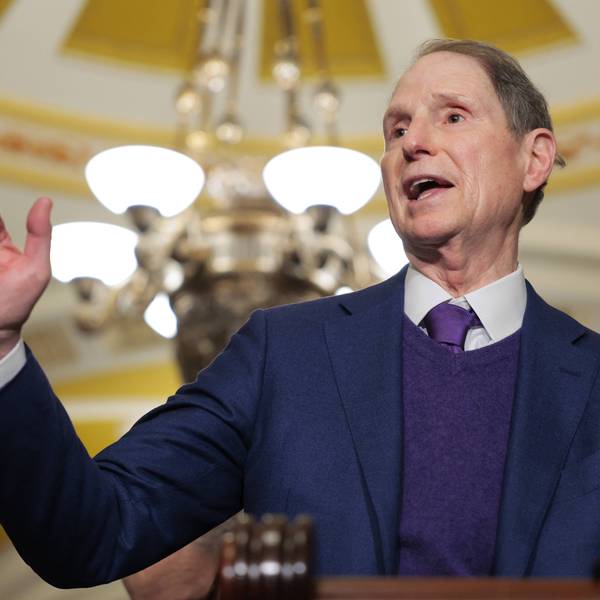
Trump’s Big Bill Will Make It Harder for Doctors to Give Patients the Care They Need
Work requirements for Medicaid don’t encourage employment; they punish illness and make recovery harder.
Like most bright-eyed medical students entering the wards for the first time, I was eager to give my patients the best that modern medicine could offer. This is far from the reality that I was confronted with—one’s insurance status dictated care as much as any guideline, evidence, or well-intentioned physician ever could.
I cared for patients whose chronic illnesses forced them to stop working, only to be told that without a job, they no longer qualified for Medicaid. The logic is cruelly circular: Lose your health, lose your job, lose your care. Work requirements for Medicaid don’t encourage employment; they punish illness and make recovery harder.
Alongside countless peers and healthcare professionals, I was incredibly disheartened on July 4, 2025 as I watched US President Donald Trump sign into law the most sweeping healthcare overhaul since the Affordable Care Act. The 870-page One Big Beautiful Bill Act (OBBBA) is projected to strip health coverage from 11.8 million Americans, leading to an estimated 24,000 preventable deaths each year—driven largely by drastic changes to Medicaid’s administration.
The current administration has long touted work requirements as a fix to Medicaid, having approved 13 Medicaid Section 1115 demonstrations with work requirements in its first term. Unfortunately, it has ignored the failures of these waiver programs and doubled down, making ineffective work requirements the law of the land.
The Majority of Medicaid Recipients Are Already Working
President Trump and his administration have repeatedly stated that the integrity of the Medicaid program needs to be restored, promoting narratives of Medicaid waste, fraud, and abuse. As such, work requirements for “able-bodied” Medicaid recipients were a key provision in the OBBBA. However, in reality, 92% of Medicaid beneficiaries are already working, caring for family, attending school, or living with a disability. Only 8% are “able-bodied” adults not seeking employment.
States Have Tried Work Requirements, They Don’t Work
Arkansas was the only state to have a statewide Medicaid work requirement waiver approved. The results were catastrophic; over 18,000 beneficiaries lost coverage in the four months before a judge ruled that the program could not continue. While enacted, the waiver failed to increase employment; instead implementation was associated with increased Medicaid churn, medical debt, and loss of health coverage.
If the ability to work remains a prerequisite for care, I will spend my career watching patients suffer
For other states, like Michigan and New Hampshire, the path to work requirements was mired with legal challenges. Both states proposed work requirements, which would have resulted in nearly 80,000 and 17,000 beneficiaries losing coverage, respectively, had the programs not been suspended before taking effect.
As of July 2025, Georgia is the only state with active work requirements through the Pathways to Coverage program. Results of this program are similarly underwhelming, with only 8,000 enrolled as of June 2025 after two years of rollout and millions spent in administrative costs. Enrollment falls far short of the projected 64,000 enrollees or the 300,000 to 400,000 Georgians who would qualify for coverage under full Medicaid expansion.
The OBBBA Doubles Down on Failed Policy
The OBBBA will require all states to follow Georgia’s path by 2027. Based on Congressional Budget Office (CBO) estimates, the federal government will save $900 billion in Medicaid spending over the next decade, with work requirements accounting for a third of the reduced spending. These savings come at an enormous cost—approximately 5 million individuals are projected to lose access to Medicaid by 2034, 1.22 million jobs in the healthcare sector will vanish in the next decade, and unemployment will rise by 0.8%. The consequences of this bill will be devastating.
Medicaid Expansion is a Job Promotion Program
Overwhelming evidence suggests Medicaid expansion has reduced uninsurance rates, increased access to healthcare and pharmaceutical care, and improved health outcomes. Moreover, hospitals in expansion states have seen increased Medicaid revenue, decreased costs of uncompensated care, and states themselves have experienced reductions in disease-related deaths, and gains in life expectancy. Importantly, overwhelming evidence shows expansion has no negative effects on workplace engagement, and rather may help increase workplace success.
If the ability to work remains a prerequisite for care, I will spend my career watching patients suffer—not because I lack the skills to help them, but because the system forbids it. Practicing medicine under those rules doesn’t just make my job harder; it risks our patients losing faith in the system altogether.
The evidence is clear, we should be expanding Medicaid, not restricting it, for the good of our patients, our hospitals, and our country.
An Urgent Message From Our Co-Founder
Dear Common Dreams reader, The U.S. is on a fast track to authoritarianism like nothing I've ever seen. Meanwhile, corporate news outlets are utterly capitulating to Trump, twisting their coverage to avoid drawing his ire while lining up to stuff cash in his pockets. That's why I believe that Common Dreams is doing the best and most consequential reporting that we've ever done. Our small but mighty team is a progressive reporting powerhouse, covering the news every day that the corporate media never will. Our mission has always been simple: To inform. To inspire. And to ignite change for the common good. Now here's the key piece that I want all our readers to understand: None of this would be possible without your financial support. That's not just some fundraising cliche. It's the absolute and literal truth. We don't accept corporate advertising and never will. We don't have a paywall because we don't think people should be blocked from critical news based on their ability to pay. Everything we do is funded by the donations of readers like you. Will you donate now to help power the nonprofit, independent reporting of Common Dreams? Thank you for being a vital member of our community. Together, we can keep independent journalism alive when it’s needed most. - Craig Brown, Co-founder |
Like most bright-eyed medical students entering the wards for the first time, I was eager to give my patients the best that modern medicine could offer. This is far from the reality that I was confronted with—one’s insurance status dictated care as much as any guideline, evidence, or well-intentioned physician ever could.
I cared for patients whose chronic illnesses forced them to stop working, only to be told that without a job, they no longer qualified for Medicaid. The logic is cruelly circular: Lose your health, lose your job, lose your care. Work requirements for Medicaid don’t encourage employment; they punish illness and make recovery harder.
Alongside countless peers and healthcare professionals, I was incredibly disheartened on July 4, 2025 as I watched US President Donald Trump sign into law the most sweeping healthcare overhaul since the Affordable Care Act. The 870-page One Big Beautiful Bill Act (OBBBA) is projected to strip health coverage from 11.8 million Americans, leading to an estimated 24,000 preventable deaths each year—driven largely by drastic changes to Medicaid’s administration.
The current administration has long touted work requirements as a fix to Medicaid, having approved 13 Medicaid Section 1115 demonstrations with work requirements in its first term. Unfortunately, it has ignored the failures of these waiver programs and doubled down, making ineffective work requirements the law of the land.
The Majority of Medicaid Recipients Are Already Working
President Trump and his administration have repeatedly stated that the integrity of the Medicaid program needs to be restored, promoting narratives of Medicaid waste, fraud, and abuse. As such, work requirements for “able-bodied” Medicaid recipients were a key provision in the OBBBA. However, in reality, 92% of Medicaid beneficiaries are already working, caring for family, attending school, or living with a disability. Only 8% are “able-bodied” adults not seeking employment.
States Have Tried Work Requirements, They Don’t Work
Arkansas was the only state to have a statewide Medicaid work requirement waiver approved. The results were catastrophic; over 18,000 beneficiaries lost coverage in the four months before a judge ruled that the program could not continue. While enacted, the waiver failed to increase employment; instead implementation was associated with increased Medicaid churn, medical debt, and loss of health coverage.
If the ability to work remains a prerequisite for care, I will spend my career watching patients suffer
For other states, like Michigan and New Hampshire, the path to work requirements was mired with legal challenges. Both states proposed work requirements, which would have resulted in nearly 80,000 and 17,000 beneficiaries losing coverage, respectively, had the programs not been suspended before taking effect.
As of July 2025, Georgia is the only state with active work requirements through the Pathways to Coverage program. Results of this program are similarly underwhelming, with only 8,000 enrolled as of June 2025 after two years of rollout and millions spent in administrative costs. Enrollment falls far short of the projected 64,000 enrollees or the 300,000 to 400,000 Georgians who would qualify for coverage under full Medicaid expansion.
The OBBBA Doubles Down on Failed Policy
The OBBBA will require all states to follow Georgia’s path by 2027. Based on Congressional Budget Office (CBO) estimates, the federal government will save $900 billion in Medicaid spending over the next decade, with work requirements accounting for a third of the reduced spending. These savings come at an enormous cost—approximately 5 million individuals are projected to lose access to Medicaid by 2034, 1.22 million jobs in the healthcare sector will vanish in the next decade, and unemployment will rise by 0.8%. The consequences of this bill will be devastating.
Medicaid Expansion is a Job Promotion Program
Overwhelming evidence suggests Medicaid expansion has reduced uninsurance rates, increased access to healthcare and pharmaceutical care, and improved health outcomes. Moreover, hospitals in expansion states have seen increased Medicaid revenue, decreased costs of uncompensated care, and states themselves have experienced reductions in disease-related deaths, and gains in life expectancy. Importantly, overwhelming evidence shows expansion has no negative effects on workplace engagement, and rather may help increase workplace success.
If the ability to work remains a prerequisite for care, I will spend my career watching patients suffer—not because I lack the skills to help them, but because the system forbids it. Practicing medicine under those rules doesn’t just make my job harder; it risks our patients losing faith in the system altogether.
The evidence is clear, we should be expanding Medicaid, not restricting it, for the good of our patients, our hospitals, and our country.
- CBO Report Shows Trump-GOP Bill Would Spur Unparalleled Wealth Transfer From Poor to Rich ›
- Trump's Big Bill Is Not-So-Beautiful for Small Businesses ›
- America Worst, Codified: Trump’s Horrific, Harmful, Horrendous Bill and Our Future ›
- Outrage Pours in After House GOP Approves 'One of the Most Catastrophic Bills Passed in Modern History' ›
- Opinion | Beware the Trump-GOP Junk Health Insurance Plans | Common Dreams ›
- Opinion | Trump's Health Plan Is Doomed to Fail—We Need Medicare for All | Common Dreams ›
Like most bright-eyed medical students entering the wards for the first time, I was eager to give my patients the best that modern medicine could offer. This is far from the reality that I was confronted with—one’s insurance status dictated care as much as any guideline, evidence, or well-intentioned physician ever could.
I cared for patients whose chronic illnesses forced them to stop working, only to be told that without a job, they no longer qualified for Medicaid. The logic is cruelly circular: Lose your health, lose your job, lose your care. Work requirements for Medicaid don’t encourage employment; they punish illness and make recovery harder.
Alongside countless peers and healthcare professionals, I was incredibly disheartened on July 4, 2025 as I watched US President Donald Trump sign into law the most sweeping healthcare overhaul since the Affordable Care Act. The 870-page One Big Beautiful Bill Act (OBBBA) is projected to strip health coverage from 11.8 million Americans, leading to an estimated 24,000 preventable deaths each year—driven largely by drastic changes to Medicaid’s administration.
The current administration has long touted work requirements as a fix to Medicaid, having approved 13 Medicaid Section 1115 demonstrations with work requirements in its first term. Unfortunately, it has ignored the failures of these waiver programs and doubled down, making ineffective work requirements the law of the land.
The Majority of Medicaid Recipients Are Already Working
President Trump and his administration have repeatedly stated that the integrity of the Medicaid program needs to be restored, promoting narratives of Medicaid waste, fraud, and abuse. As such, work requirements for “able-bodied” Medicaid recipients were a key provision in the OBBBA. However, in reality, 92% of Medicaid beneficiaries are already working, caring for family, attending school, or living with a disability. Only 8% are “able-bodied” adults not seeking employment.
States Have Tried Work Requirements, They Don’t Work
Arkansas was the only state to have a statewide Medicaid work requirement waiver approved. The results were catastrophic; over 18,000 beneficiaries lost coverage in the four months before a judge ruled that the program could not continue. While enacted, the waiver failed to increase employment; instead implementation was associated with increased Medicaid churn, medical debt, and loss of health coverage.
If the ability to work remains a prerequisite for care, I will spend my career watching patients suffer
For other states, like Michigan and New Hampshire, the path to work requirements was mired with legal challenges. Both states proposed work requirements, which would have resulted in nearly 80,000 and 17,000 beneficiaries losing coverage, respectively, had the programs not been suspended before taking effect.
As of July 2025, Georgia is the only state with active work requirements through the Pathways to Coverage program. Results of this program are similarly underwhelming, with only 8,000 enrolled as of June 2025 after two years of rollout and millions spent in administrative costs. Enrollment falls far short of the projected 64,000 enrollees or the 300,000 to 400,000 Georgians who would qualify for coverage under full Medicaid expansion.
The OBBBA Doubles Down on Failed Policy
The OBBBA will require all states to follow Georgia’s path by 2027. Based on Congressional Budget Office (CBO) estimates, the federal government will save $900 billion in Medicaid spending over the next decade, with work requirements accounting for a third of the reduced spending. These savings come at an enormous cost—approximately 5 million individuals are projected to lose access to Medicaid by 2034, 1.22 million jobs in the healthcare sector will vanish in the next decade, and unemployment will rise by 0.8%. The consequences of this bill will be devastating.
Medicaid Expansion is a Job Promotion Program
Overwhelming evidence suggests Medicaid expansion has reduced uninsurance rates, increased access to healthcare and pharmaceutical care, and improved health outcomes. Moreover, hospitals in expansion states have seen increased Medicaid revenue, decreased costs of uncompensated care, and states themselves have experienced reductions in disease-related deaths, and gains in life expectancy. Importantly, overwhelming evidence shows expansion has no negative effects on workplace engagement, and rather may help increase workplace success.
If the ability to work remains a prerequisite for care, I will spend my career watching patients suffer—not because I lack the skills to help them, but because the system forbids it. Practicing medicine under those rules doesn’t just make my job harder; it risks our patients losing faith in the system altogether.
The evidence is clear, we should be expanding Medicaid, not restricting it, for the good of our patients, our hospitals, and our country.
- CBO Report Shows Trump-GOP Bill Would Spur Unparalleled Wealth Transfer From Poor to Rich ›
- Trump's Big Bill Is Not-So-Beautiful for Small Businesses ›
- America Worst, Codified: Trump’s Horrific, Harmful, Horrendous Bill and Our Future ›
- Outrage Pours in After House GOP Approves 'One of the Most Catastrophic Bills Passed in Modern History' ›
- Opinion | Beware the Trump-GOP Junk Health Insurance Plans | Common Dreams ›
- Opinion | Trump's Health Plan Is Doomed to Fail—We Need Medicare for All | Common Dreams ›

